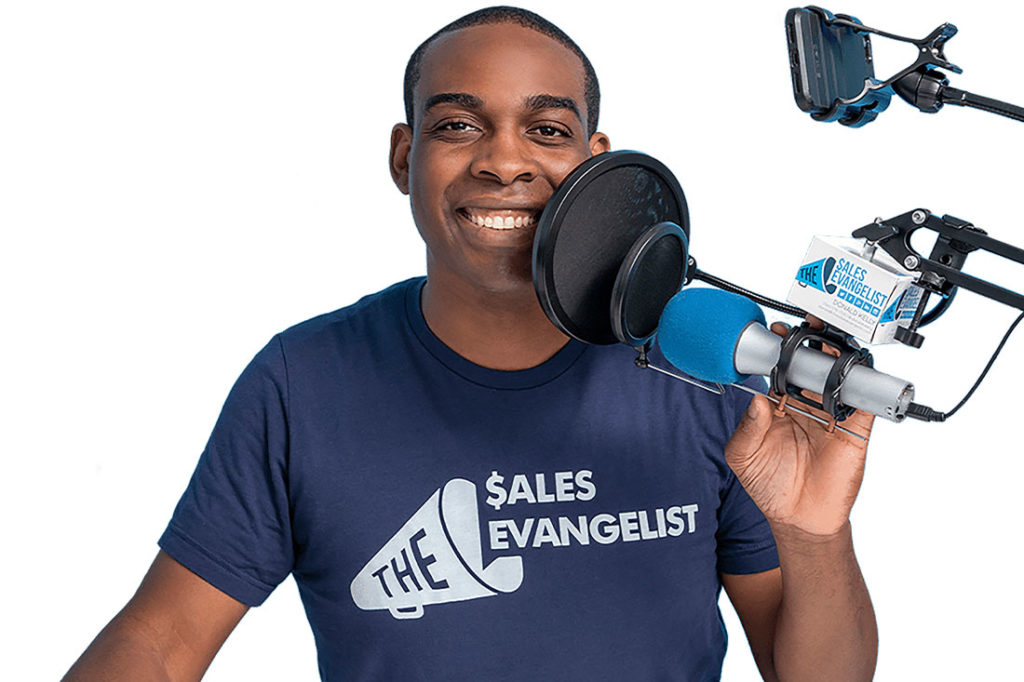When Donald Kelly was 6 years old, he wanted to make a little pocket cash. His family’s yard in Jamaica had a large mango tree, so one day, he picked a few sweet, juicy mangoes, set up a table in the front yard, and tried to sell them to neighbors.
“It wasn’t fruitful—no pun intended—but it was an interesting experience,” Kelly says. “It catapulted me.” If you want to make money, he thought at the time, you need to figure out how to sell something.
Although he didn’t turn a profit on the mangoes, the itch to sell stuck. Now Kelly, who lives in West Palm Beach, Florida, is a sales expert who shares tips, tricks and advice to salespeople across the country. He runs The Sales Evangelist, a consulting firm, and hosts The Sales Evangelist podcast, which has over 1,200 episodes and 2.5 million total downloads. He has a new book on the way, too, with an apt title: Sell It Like a Mango.
It’s In His DNA
Kelly, 37, was born in the Kingston area of Jamaica. When he was 6 years old, his mom moved to Florida for work. Kelly lived with his aunt until he was 9, at which point he moved to the U.S. to join his mother.
“My mom hustled for three years and did all of the things that immigrant families would do—work multiple jobs and all kinds of things—so that when we came to the United States, we’d have an opportunity to succeed,” he says.
Although Jamaica has an excellent education system, it’s still a third-world country with a third-world economy, Kelly says. The average monthly salary is just $500. Because of the lack of steady, reliable jobs, many Jamaicans—including Kelly’s father and countless other members of his family—turn to entrepreneurship.
“I’ve seen everyone in my family do entrepreneurial things, whether it was reselling clothes they bought in the U.S., selling peanuts, or having a little restaurant,” he says. “You did what you needed to do to survive. You created opportunities.”
After attempting to peddle mangoes to his neighbors as a young boy, Kelly realized that he enjoyed the hustle of sales—of trying to make something out of nothing. Later, when he was in middle school in the U.S., he tried to earn some spending cash by buying candy from Alberton’s grocery store and reselling it for a profit to kids at school.
Kelly got his first real sales gigs during college, where he did timeshare presentations and worked for Dish Network. He briefly considered other professions, like law and writing, but eventually decided to follow his natural inclination for selling.
In 2013, while building his sales career, a friend of Kelly’s introduced him to podcasting. Kelly started his own podcast, The Sales Evangelist, and interviewed fellow sellers about what worked and what didn’t, essentially “evangelizing” about the topic. A guest appearance from one of the most popular voices in the industry—Jeffrey Gitomer—put Kelly’s show on the map. Since then, he’s been on a mission to help salespeople across the globe perfect their craft.
Time To Hustle
Whether you’re a seasoned pro with two decades of experience or you’re fresh out of college and looking to rise up, Kelly offers these seven pieces of sales wisdom:
#1 You shouldn’t feel like you’re being pushy.

“The biggest misconception people have about working in sales is that you have to convince people to do something,” Kelly says. Instead, think about sales like this: Someone has a problem, and you have a solution that’s in their best interest.
Great sellers aren’t trying to manipulate someone into buying something, but rather they’re asking effective questions and probing deeper and deeper until they figure out how to help a buyer solve a problem in their life.
“The greatest salespeople are the ones who are almost like therapists,” Kelly says. “They know that great questions lead a buyer to come to a conclusion about whether this is something they should invest in or not.”
#2 All great sellers have two qualities in common.
Salespeople who are at the top of their game typically exhibit two specific qualities: empathy and curiosity.
“Great salespeople who are empathetic understand where the buyer is,” Kelly says. “But in addition to that, they must be curious because curiosity leads to asking engaging questions.”
Kelly offers the example of someone who comes in to buy a computer. Many sellers would assume the person is buying the computer for themselves. But perhaps they’re buying it for their 14-year-old son who loves gaming. “If I’m not curious enough to dig and be empathetic toward you, you will think this guy is just trying to sell me something, rather than this person is genuinely curious about me and my situation and wants me to thrive and succeed,” he says.
#3 There’s one reason sellers often underperform.
There are sellers with five, 10 or even 20 years of experience who still struggle to close deals, and it’s not because they lack expertise. It’s because they think they’ll fail.
“The No. 1 problem most professional sellers have is the belief that they cannot succeed,” Kelly says. “That belief leads to negative habits, and those negative habits limit us.”
Take, for example, someone who believes the customer they’re about to call will reject them. “That person is not going to pick up the phone and make that call because they’ve already defeated themselves in their belief system,” Kelly says. And even if that person does muster enough courage to call, if they still believe the prospect will say no, they’ll fold every time they’re met with an “I’m not interested” or “It’s not a good time right now.”
“They cave because they’ve already convinced themselves that it wasn’t going to work, and then it becomes a self-fulfilling prophecy,” Kelly says. “If I believe that people don’t want to buy from me, that’s going to be at the core of everything I do.”
#4 You can’t succeed by cutting corners.
While belief is the No. 1 reason salespeople underperform, Kelly says the second reason is typically because they don’t want to identify potential new customers, which is referred to as lead prospecting.
In fact, 40% of salespeople said lead prospecting is the hardest part of their job, according to a study from marketing company HubSpot. But even though it’s a less-than-enjoyable task, lead prospecting is the key to gaining new clients and, in turn, growing one’s business.
#5 Thinking outside the box will help you stand out from competition.
When training sellers, Kelly often teaches them to do what he calls “breaking through the monotony.” It means doing the opposite of what everyone else is doing—to zig where others zag.
For example, most sellers send emails, make phone calls or write LinkedIn messages to prospective clients. Shake things up by sending video or audio messages, or even snail mail, Kelly says. You’ll be surprised by how effective this simple switch-up can be.
#6 Failure is part of the game.
Our ability to deal with failure is often hardwired in us. Some people handle it better than others, likely because they have high self-esteem and their formative role models growing up modeled appropriate behavior.
If you struggle with fear of failure, that doesn’t mean you can’t succeed in a sales position. But great salespeople know it’s part of the game, and over time, they learn to not take no personally.
“They’re not rejecting Donald Kelly,” Kelly often tells himself. “They’re rejecting someone calling them and intruding on their day.”
#7 Thick skin is crucial.
There’s a common sentiment that in order to work in sales, you need to be confident, self-assured and able to face rejection head-on without taking things too personally.
Kelly says this is 100% true.
“When you’re making 30 or 40 phone calls a day, and you’re getting rejected and people are saying no over and over again, it’s really difficult to make that next phone call,” he says. “You need the bulletproof mindset to say, ‘I’m going to keep pushing through, and I’m going to keep working.’ ”
This article originally appeared in the November/December 2021 Issue of SUCCESS magazine. Photo Courtesy of Donald Kelly





